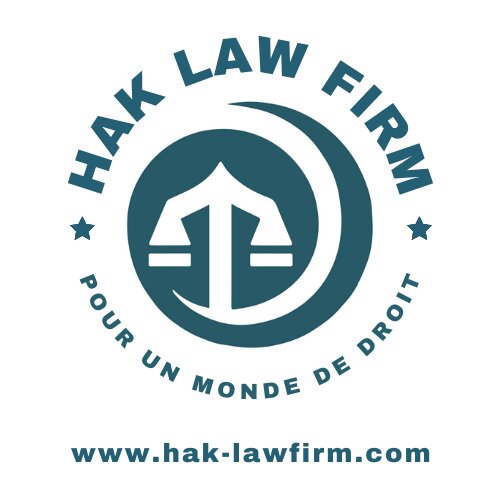Best Education Law Lawyers in DR Congo
Share your needs with us, get contacted by law firms.
Free. Takes 2 min.
Or refine your search by selecting a city:
List of the best lawyers in DR Congo
About Education Law in DR Congo
Education Law in the Democratic Republic of the Congo (DR Congo) encompasses the regulations and policies that govern the educational system within the country. It addresses a broad spectrum of issues, including the establishment and management of schools, the rights and responsibilities of students and teachers, educational standards, and the administration of educational institutions at all levels, from primary schools to universities. The legal framework is influenced by both national legislation and international agreements to which DR Congo is a signatory, such as the United Nations Convention on the Rights of the Child.
Why You May Need a Lawyer
Individuals and institutions may require legal assistance in education law for various reasons. Common situations include:
- Disputes regarding the enrollment and admission processes in educational institutions.
- Cases of discrimination based on ethnicity, gender, or disability within schools.
- Disciplinary actions or grievances involving students, teachers, or administrative staff.
- Issues related to the licensing and accreditation of educational facilities.
- Understanding and navigating the laws concerning education funding and resources.
- Contracts and employment issues within educational institutions.
Local Laws Overview
The legal landscape of education in DR Congo is shaped by several key pieces of legislation:
- The General Education Act: This act outlines the structure and function of the national education system, including access to free and compulsory education at the primary level.
- Child Protection Legislation: Supports the rights of children to education and protection against violence and exploitation.
- Teacher Service Regulations: Governs the employment, conduct, and responsibilities of teachers within the educational system.
- Higher Education Guidelines: Sets the standards and accreditation requirements for tertiary institutions and programs.
Frequently Asked Questions
1. What age is education mandatory in DR Congo?
Education is compulsory for children aged 6 to 12 years, corresponding to the primary schooling years.
2. Are there laws against discrimination in schools?
Yes, both national laws and international agreements protect against discrimination based on race, gender, religion, or ability.
3. Who regulates private schools in DR Congo?
Private schools must comply with Ministry of Education standards, including curriculum guidelines and teacher qualifications.
4. How can one address an issue of bullying in school?
It's advised to initially address bullying through school administrative channels, but legal options exist if resolutions aren't satisfactory.
5. What rights do students have in disciplinary actions?
Students are entitled to a fair hearing and can appeal against unjust disciplinary measures according to education regulations.
6. How is the quality of education ensured?
The Ministry of Education regularly reviews curriculums and schools for compliance with national educational standards.
7. Can foreign children access public education?
Yes, all children residing in DR Congo have access to public education, though they may need to provide certain documentation.
8. What support is available for disabled students?
There are laws requiring schools to accommodate students with disabilities, though resources can vary by institution.
9. Can legal action be taken against a school for failing its duties?
Yes, legal recourse is available for failures such as neglect of duty or breach of contract with legal assistance.
10. What is the process for establishing a new private school?
Establishing a private school involves obtaining licenses from the Ministry of Education and fulfilling land use and infrastructure requirements.
Additional Resources
Several organizations and governmental bodies offer resources and support related to education law in DR Congo, including:
- The Ministry of Education: Provides official information and regulations regarding education policies.
- UNICEF DR Congo: Offers resources on children's rights and education guidelines.
- Local Legal Aid Organizations: Can provide free or low-cost consultations for education-related legal issues.
Next Steps
If you need legal assistance in education law, consider the following steps:
- Identify and clearly document the issue or dispute you are facing.
- Consult with a legal advisor specializing in education law to explore your options.
- Engage with any relevant school or governmental administrative processes as advised.
- Seek recommendations for reputable lawyers from trusted sources such as local bar associations.
- Evaluate all legal advice carefully and choose a course of action that aligns with your goals and needs.
Lawzana helps you find the best lawyers and law firms in DR Congo through a curated and pre-screened list of qualified legal professionals. Our platform offers rankings and detailed profiles of attorneys and law firms, allowing you to compare based on practice areas, including Education Law, experience, and client feedback.
Each profile includes a description of the firm's areas of practice, client reviews, team members and partners, year of establishment, spoken languages, office locations, contact information, social media presence, and any published articles or resources. Most firms on our platform speak English and are experienced in both local and international legal matters.
Get a quote from top-rated law firms in DR Congo — quickly, securely, and without unnecessary hassle.
Disclaimer:
The information provided on this page is for general informational purposes only and does not constitute legal advice. While we strive to ensure the accuracy and relevance of the content, legal information may change over time, and interpretations of the law can vary. You should always consult with a qualified legal professional for advice specific to your situation.
We disclaim all liability for actions taken or not taken based on the content of this page. If you believe any information is incorrect or outdated, please contact us, and we will review and update it where appropriate.
Browse education law law firms by city in DR Congo
Refine your search by selecting a city.












